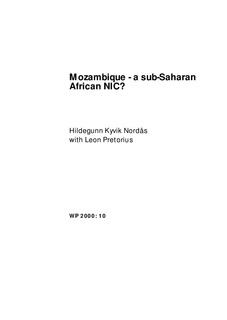| dc.description.abstract | This paper analyzes and explains foreign direct investment (FDI) in Mozambique. The country was one of the fastest growing countries in the world during the second half of the 1990s, and FDI has followed growth with a lag. FDI is dominated by South African and Portuguese companies, it is concentrated in the Maputo corridor, and one major project, an aluminium smelter plant, accounts for more than 60 per cent of total accumulated FDI. The driving forces for FDI appear to be access to natural resources, particularly cheap energy, a reasonably well developed infrastructure and regional economic integration. The most important direct impact of FDI in Mozambique is export earnings, easing the foreign exchange constraint on investments. Since the foreign investments are concentrated in mature, capital-intensive industries, job creation is limited and depends on the development of backward linkages to the local economy. | |
